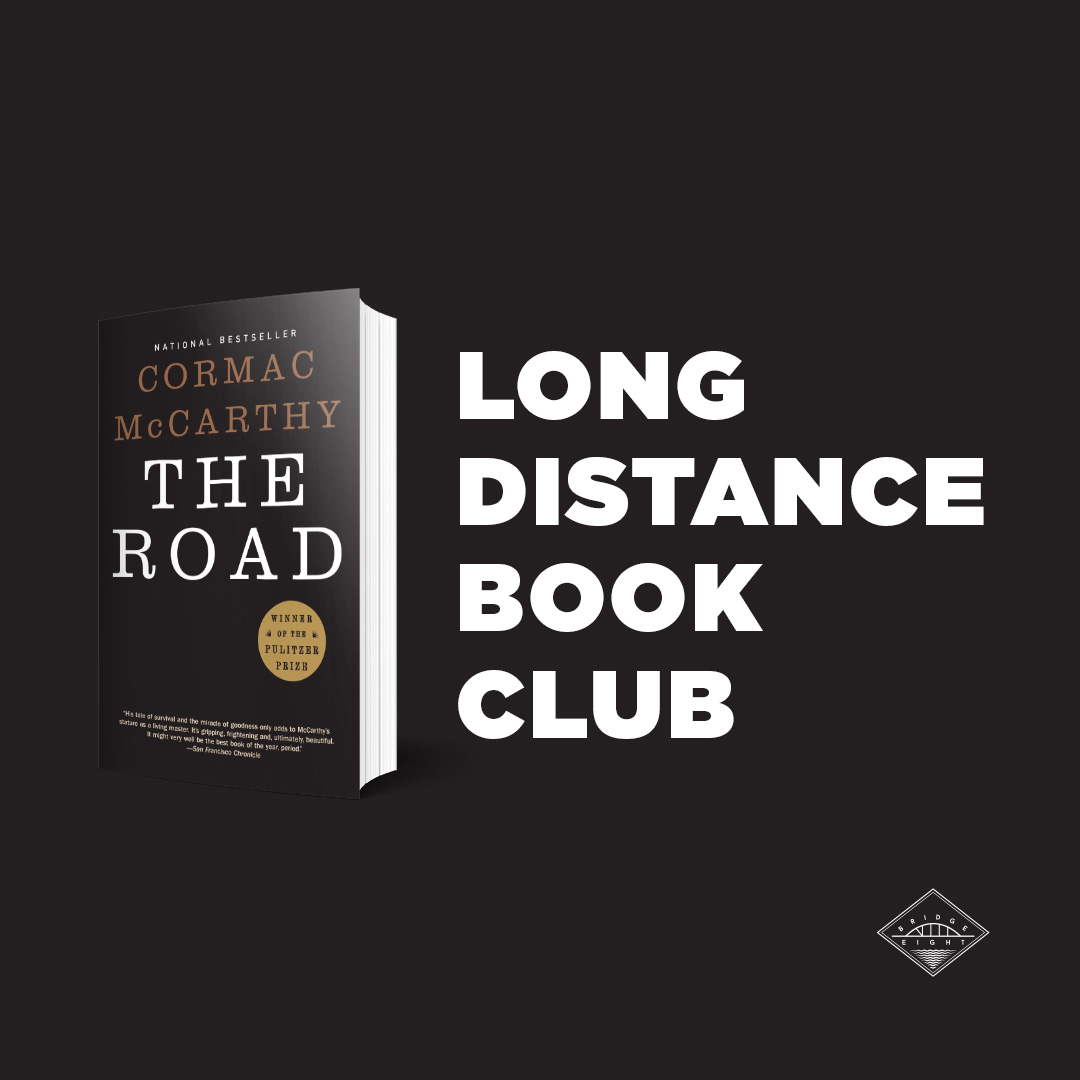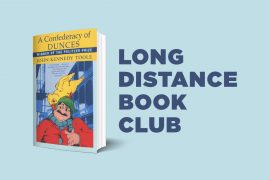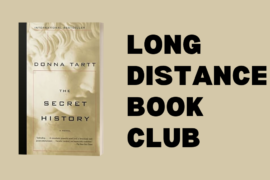Long Distance Book Club was created out of a desire to analyze works we admire with people we don’t often see in person. Using a google document, we invited a few friends to discuss The Road over several weeks. We hope you enjoy.
The Man
Caleb Michael Sarvis: I was thinking about this as I read, but is the man a reliable narrator? Is he someone we can trust? I’m asking this without having finished the book yet, but I figured we can start the discussion now and go from there.
Riley Manning: The man’s not the narrator. The only thing that feels hard to buy is how much of a macgyver (sp?) the Man is. In their first run in with the road gang, it’s hinted at that he used to be a doctor. But even given that he’s educated, he seems to know quite a lot, or to think very high-mindedly. Similar thoughts about the wife. There’s that gut-wrenching memory of him trying to talk her out of killing herself. That “I have a new lover now” line feels a little out of place, depending on how allegorical you’re reading the story.
CMS: Yeah, I shouldn’t have said narrator. I’m just curious about the fact that we’re learning about the world the same way the boy is. All the questions he asks are things we want to know–but should we take the man’s word when he answers? We don’t really have a choice, so.
C.H. Hooks: I get that we’re not talking about the boy here, but how is it that we catch on so much faster than the boy? This is a failure on the man’s part. I kept thinking of him as The Man in The Yellow Hat and the boy as Curious George. Their relationship was elementary. The man knew the entire time that he was dying, but never taught the boy anything exceptionally useful except how to pull the trigger on himself when the time came. The man did everything for the boy, who was a basket case and yet the book was all about his survival. Why do we, as readers, feel invested in their survival? Do we want them to just end it and let the world choke itself out with some finality? I struggled to figure out what I hoped for while reading it, and yet the man continued to encourage the boy to be hopeful when his own hope and emotion was lost.
CMS: I think that’s what I was getting at with my initial question. It seemed like the nature of the world they occupied didn’t allow for a stronger relationship to build. The desire to get to the coast didn’t mutate into anything else, really. There is something to be said about these “characters” and I used quotations because I don’t know that they really were characters.
RM: I hadn’t thought about that, Chris. It is odd that the Man wasn’t teaching him any skills. In that light, the book feels far less complete. But also, what is there to teach? There’s no hunting, no farming. The Boy knows how to make a fire and keep a lookout. What else is there? The Man doesn’t exactly know what he’s doing.
But Caleb, I feel what you’re saying, too, that there’s a fable-like quality to The Road that bends what feels (or should feel [or should not feel]) realistic. There’s more to this book and these characters than, like, pragmatism.
The Boy
RM: The boy’s at an age where he’s starting to make up his mind about how the world works, and we see him undergo these changes in beautifully subtle ways. He stops picking up toys, for instance, he questions whether they’re the good guys in an increasingly complex way, he seems to get more comfortable with the gun, etc.
CMS: I felt increasingly confused about the boy’s age as the novel went on, and now I’m thinking about the time that actually passed in the story. The boy as the moral compass worked for me, but his decision to go with the other people at the end felt a little easy to me, maybe. Then again, he had no other option, really. He wasn’t going to kill anybody.
CH: Grumble. I think the boy’s character was my biggest gripe. The end felt so quick and I blame the boy. He aged five years for me in the last three pages. I understand that he was forced to grapple with responsibility with immediacy, but geez. I gather that the book could have continued on indefinitely (so long as the boy lives) if we weren’t wrapped up with a bow at the end, but something more was necessary. I normally dig some ambiguity as to a future situation—it’s fine to leave me wondering (or wandering, in this case,…tee-hee)—but the interaction regarding carrying the fire and such was barely tethered to the rest of the story.
CMS: I didn’t mind the man dying and the boy continuing on. I was into that as a story ender, but I do think we were missing something in terms of desire… was survival all they were ever looking for?
Grace Lanoue: I need to start with “the boy” because I am pissed off–in general–with the boy. As a reader, I didn’t feel his changes were enough or (rather) they were poorly done. Yes, yes small progress: no toys–I am an adult now, but Jesus from those small changes to the end was too fast. And quite frankly, not believable. Also, I’m not sure if “survival” as a desire was enough of a driving factor behind everything. Maybe it’s the “bond between father and son” thing that didn’t exactly work for me. In my mind: “man died, of course you move on, that’s life.” I would have been more surprised if the boy chose to just stay by his father’s dead body for the next five years. Let’s write that sequel: “The Boy and the Body.”
CMS: “The Boy and the Body” is the title of my poem about masturbation.
RM: OoOoh Let me dim the lights. Anyone got an idea about the timespan of the book? It starts in winter and near the end it says it’s winter again. So…. a year? I’m with you, Caleb, the ending feels too easy. I would have liked it ending with the Man’s death, then the paragraph about the fish. Maybe.
CMS: One year sounds believable, especially with the shape and the events of the book.
Punctuation?
CMS: No quotation marks, no apostrophes, at least not for negative contractions. “They’d” has an apostrophe, but “cant” and “wont” and “dont” do not. Why?
RM: I feel like it fits with the barrenness. I found it most noticeable when people are talking. It’s easy to lose track of who’s saying what, but I don’t mind it. Especially these one-off conversations between the Man and the Boy, it’s interesting to think of the boy’s questions coming from the Man. Because the Man isn’t sure of anything. At times, it also feels like a conversation he’s having with himself. Like he’s talking out loud or something.
CMS: I liked imagining everything so dead and barren that it was silent. That all this communication was done in a really primal and understated way.
CH: I was used to the lack of quotation marks because I was fresh off of reading No Country over the summer. The apostrophe shortage was strange. I never quite established a mental pattern for when they were used and when they weren’t. Admittedly, I didn’t devote too much attention to it because it became normal quickly. I guess this means it was fairly effective. It made sense on some level because of the disappearance of social norms (maybe?).
GL: I get easily distracted by punctuation, so this was a huge issue for me. For the same reason that I couldn’t read Milk and Honey (for fuck sake, we capitalize “i”), I felt the odd punctuation structure caused me to pause and break away from the actual content. However, after about thirty pages, I would give in to the structure, but then I would put the book down for a few days and when I picked it back up: punctuation frustration.
CMS: “Punctuation Frustration” is the title of my poem about Kelly Kapoor from The Office.
Structure
CMS: No chapters. A lot of sections breaks. It provided a lot of stopping points, but it definitely changed the way I usually read a book.
RM: The lack of chapters didn’t feel exhausting to me, maybe simply because not much happens. So many of McCarthy’s books are characters getting from one place to another. When something does happen, it’s an incident short enough to read straight through, like when they find the people chained up in the basement.
A lot of writers try to do tricky things with form/grammar, etc., but it’s purposeful here. There’s no structure, frequent stopping points, a general sense of questioning yourself and your interpretation of what you’re experiencing—sounds a lot like what’s going on in the novel.
CH: I’m with Riley on this one. Their situation changes often and without warning. I imagine if there was more structure the book would be a struggle in a different way (than just the tough content).
GL: While I suffered from punctuation frustration, the overall structure was fine to me. In fact, a different–more concrete– structure would have been too disruptive to the overall storyline.
CMS: It was a surprisingly smooth read, considering, and as a writer, I’m into the idea that I could write something that doesn’t need to tie up into “chapters.” For something so monotonous, I never felt all that bored.
What the Fuck Happened?
CMS: There are veiled references to what happened. We know people eat people. But is this a post-nuclear thing?
RM: It’s so curious that there’s no wildlife, hardly any plants, even. I don’t know what to make of that. I guess with the constant ash and the diminished sun, if plants don’t grow, everything else dies, too. But it feels bigger than a natural phenomenon, or even a man-made one, or even a religious one. There’s a sense of cosmic abandonment, and that abandonment is what’s at the heart of The Road, for me. I guess that’s what qualifies McCarthy as a Southern writer, too.
CH: Surely the Yellowstone Caldera blew.
https://www.vox.com/2014/9/5/6108169/yellowstone-supervolcano-eruption
CMS: There’s enough mention of ash to make that pretty plausible. I’m into that idea. I’m super into a story without much of a history lesson. When I watched the trailer for the movie, it looks like they tried to throw a lot of the past into it and I was not down for that. It’s what made A Quiet Place work for me, too.
RM: I thought the same thing about A Quiet Place! Did anyone read Edan Lepucki’s California? Also post-apocalyptic with next to no back story, from what I recall.
CMS: No, but I wanted to! I really enjoyed her visit to UT that one semester.
What’s lingering with you now?
CMS: I can’t stop thinking about the beheaded infant. That’s so metal.
RM: There’s one scene where they see the road gang pass by and they’ve got like a dozen women (some pregnant) with them and young boy sex slaves linked together by collars or something. Yeesh.
And that basement scene. Not only when they see the actual people, but when they realize the, like, system the captors are using to catch people. Super chilling.
https://www.theguardian.com/theobserver/2009/dec/20/observer-profile-cormac-mccarthy
Here’s an interesting profile on McCarthy, and he’s super ambiguous about what happened. The only certainty is that it seems like such a disaster is bound to happen sooner or later. The Road just makes it feel like we’ve earned it. It’s haunting to think about such an event reducing the earth to just another lifeless hunk of rock in space.
“He once argued that he could see no point at all in literature that did not dwell on death,” says the article. What do y’all think about that?
CH: This book couldn’t exist now that grocery carts have wheel locks. My suspension of disbelief is shot. They wouldn’t have gotten out of the parking lot of H.E.B. (since they’re probably in Texas).
GL: I find myself paying attention to insignificant objects now–in an obsessive, creepy way. Like the rearview mirror of my car has a whole new meaning–I’m constantly looking back in fear of what might be lurking or following me.
CMS: Maybe it’s a cart from a Piggly Wiggly. Do they have locks? I think that McCarthy quote has a lot of merit – I mean I would say that about all art really. Death is the heartbeat of humanity, would we make any anything if we weren’t certain of our own mortality? I don’t think so.
RM: Don DeLillo’s protagonist in White Noise says that all plots move death-ward. I find that hard to disagree with, especially if it can be taken to mean a not-exactly-literal death. I’d say most art is at least death-conscious. No grocery carts have wheel locks in Mississippi. This is the first I’ve heard of them.
CMS: This is solid information. I’ve lived most my life with wheel-lock grocery carts. In Florida, at least, if you try to take them too far from the store, they become useless.
GL: “Wheel-lock Grocery Carts” is the title of my short story about finding love in WalMart.
Last Remarks? Rating?
CMS: This was a book sitting on my shelf for a long time. I mostly read it for research reasons (the project I’ve just finished is post-apocalyptic in its own way), but it’s a tough lens when you throw Pulitzer Prize Winner on the cover like that. I’m happy to have read it, to have it in my repertoire, and I loved a lot of sentences individually, but, alas, I’m giving it a 4 out of 5.
RM: In some ways it gets richer with a second read, and in some ways it doesn’t hold up as much. I give it 4 out of 5, but, like, a really solid 4.
Drinking game: shot every time you read the phrase “of the world.”
GL: I’m going to give it a 3 out of 5 (glance in my rearview mirror to make sure McCarthy isn’t coming after me). I think this second read was worse for me. I feel like my rating three years ago would have been 4 out of 5. I guess, now, I am just a different woman “of the world”. Drink, bitches.
CH: I’m struggling with the rating. I know that the book is good, and loved No Country. All wheel-locks aside, I have to give the book 4 out of 5. McCarthy was incredibly effective in building dread and unease. It was so effective that I dreaded picking up the book at night—which may not have been the intended effect. I enjoyed the writing. I would have to say that the writing kept me reading, but I didn’t enjoy reading the book. Does that make sense? I felt pretty down about things after finishing it.
About the attendants
CALEB MICHAEL SARVIS is the author of Dead Aquarium (Mastodon Publishing 2019), the senior fiction editor for Bridge Eight Press, and co-host of the Drunken Book Review Podcast. His work can be found in Volt, Hobart, Split Lip, Saw Palm, and others.
RILEY MANNING is an associate editor for Bridge Eight Press. His work can be found in your mom’s inbox.
GRACE LANOUE holds an MFA from the University of Tampa. Currently, she teaches writing and English at UMass Dartmouth. Her fiction has been published in Bridge Eight, Underpass Review, Oyster River Pages, and others. She is a native Floridian.
C.H. HOOKS is the author of Alligator Zoo-Park Magic (Bridge Eight Press 2019). His short works have been published in print and online publications, including American Short Fiction and Burrow Press. He teaches at the College of Coastal Georgia.
Have something to add?
We’d love to hear from you. Send your thoughts via email to editors@bridgeeight.com.



